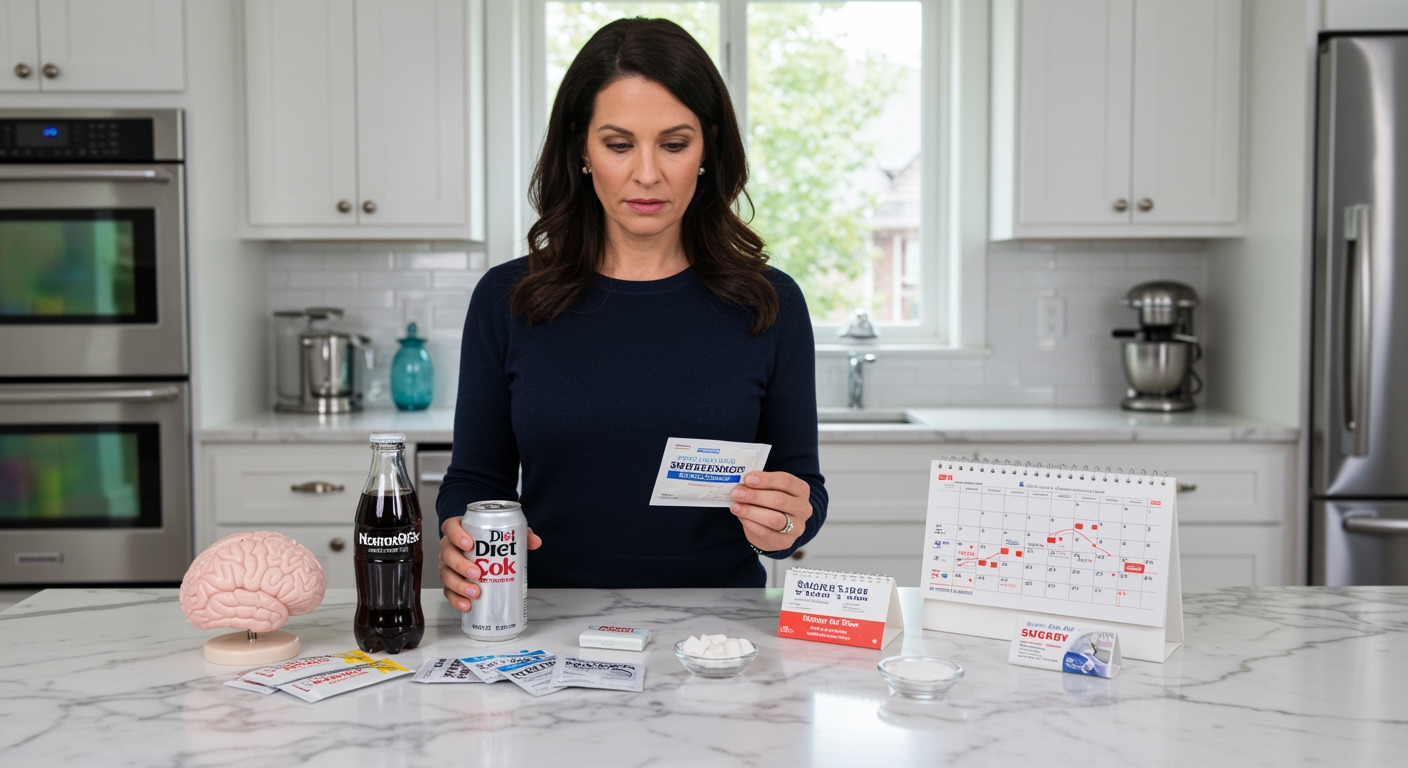✪ Key Highlight: Brazilian study reveals artificial sweeteners may accelerate brain aging by 1.6 years through 62% faster cognitive decline.
Introduction
Millions of people reach for artificial sweeteners every day, believing they make the healthier choice.
A groundbreaking new study from Brazil has shattered this assumption, revealing that these sugar substitutes may actually speed up brain aging by more than a year and a half.
Hi, I’m Abdur, your nutrition coach, and today I’m going to analyze this alarming research that tracked nearly 13,000 adults for eight years and discovered artificial sweeteners accelerate cognitive decline by 62%.
What Did This Brazilian Study Actually Find?
Researchers from the University of São Paulo followed 12,800 adults with an average age of 52 for approximately eight years.
They tracked consumption of seven common artificial sweeteners: aspartame, saccharin, acesulfame-K, erythritol, xylitol, sorbitol, and tagatose.
Participants underwent regular testing of their memory, language skills, and thinking abilities throughout the study period.
The results were startling: people who consumed the most artificial sweeteners showed a 62% faster decline in cognitive abilities compared to those who consumed the least.
This translates to approximately 1.6 extra years of brain aging for heavy users of these sugar substitutes.
Even moderate consumers experienced a 35% faster decline, equivalent to about 1.3 years of additional brain aging.
✪ Fact: Six out of seven tested artificial sweeteners showed links to faster cognitive decline, with only tagatose appearing safe.
Why Are Younger People More At Risk?
The most surprising finding was that the strongest link between sweetener use and cognitive decline occurred in people younger than 60.
Dr. Claudia Kimie Suemoto, the lead researcher, explained that she expected older adults to show stronger associations since they face higher dementia risk.
Instead, the data revealed that midlife exposure to artificial sweeteners may be particularly harmful for brain health.
This finding is crucial because midlife represents a critical period for setting the trajectory of long-term brain health.
People with diabetes also showed stronger associations between sweetener consumption and cognitive decline.
This creates a concerning dilemma since diabetics are often encouraged to use artificial sweeteners to manage their blood sugar levels.
✪ Note: The brain changes that lead to dementia often begin decades before symptoms appear, making midlife protection crucial.
How Might Artificial Sweeteners Damage Your Brain?
While the exact biological mechanisms remain unknown, researchers have proposed several theories about how artificial sweeteners might harm brain function.
These sweeteners may break down into chemicals that are toxic to brain cells or trigger inflammatory responses in neural tissue.
Some artificial sweeteners can cross the blood-brain barrier, a protective membrane that normally shields the brain from harmful substances.
Once inside the brain, these compounds might interfere with neurotransmitter function or damage the delicate cellular structures responsible for memory and thinking.
Previous research has also linked artificial sweeteners to changes in gut bacteria, which increasingly appears connected to brain health through the gut-brain axis.
The inflammation caused by disrupted gut microbiomes may contribute to accelerated cognitive decline and increased dementia risk.
✪ Pro Tip: Your gut produces neurotransmitters like serotonin that directly affect brain function and mood regulation.
What Are The Study Limitations We Should Consider?
This research was observational, meaning it can show associations but cannot prove that artificial sweeteners directly cause cognitive decline.
The study relied on self-reported dietary data, which participants provided only at the beginning of the research period.
People often underestimate or forget their actual consumption of processed foods and beverages containing artificial sweeteners.
Other lifestyle factors associated with high sweetener consumption could be responsible for the observed cognitive decline.
The Calorie Control Council, representing the low-calorie food industry, emphasized these limitations and stressed that the findings show correlation, not causation.
However, Dr. Suemoto still advised caution, suggesting people reduce their intake of artificial sweeteners as much as possible while more research is conducted.
✪ Note: Observational studies often provide the first important clues about health risks before controlled trials can be conducted.
What Should You Do About Artificial Sweeteners Now?
The evidence suggests a cautious approach to artificial sweetener consumption, especially for people under 60 and those with diabetes.
Start by reading ingredient labels on all processed foods, beverages, gums, mints, and medications to identify hidden sources of artificial sweeteners.
Consider gradually reducing your dependence on intensely sweet tastes by allowing your taste buds to adapt to less sweetened foods.
Natural alternatives like small amounts of honey, maple syrup, or fruit purees may be safer options for occasional sweetening needs.
Focus on whole foods that provide natural sweetness along with beneficial nutrients, fiber, and antioxidants.
If you have diabetes, work with your healthcare provider to develop a sweetening strategy that balances blood sugar management with potential cognitive risks.
✪ Pro Tip: Your taste preferences can change within 2-3 weeks of reducing artificial sweetener consumption.
The Bottom Line
This Brazilian study adds to growing evidence that artificial sweeteners may not be the harmless sugar alternatives we once believed them to be.
Your brain health is too precious to gamble with convenience foods that promise quick fixes but deliver long-term consequences.
I want to hear your thoughts on this research and any experiences you have had with artificial sweeteners – please share your questions, concerns, or success stories in the comments below.
References
At NutritionCrown, we use quality and credible sources to ensure our content is accurate and trustworthy. Below are the sources referenced in writing this article:
- Powers Health: Sugar Substitutes Could Be Bad for Brain Aging
- Medical News Today: 7 Sugar Substitutes Linked 62% Faster Decline Thinking Memory Skills Aging
- PubMed: Artificial Sweeteners and Cognitive Decline Study
- American Academy of Neurology: Sugar Substitutes Linked to Faster Cognitive Decline
- Neurology Journal: Low- and No-Calorie Sweetener Consumption and Cognitive Decline





